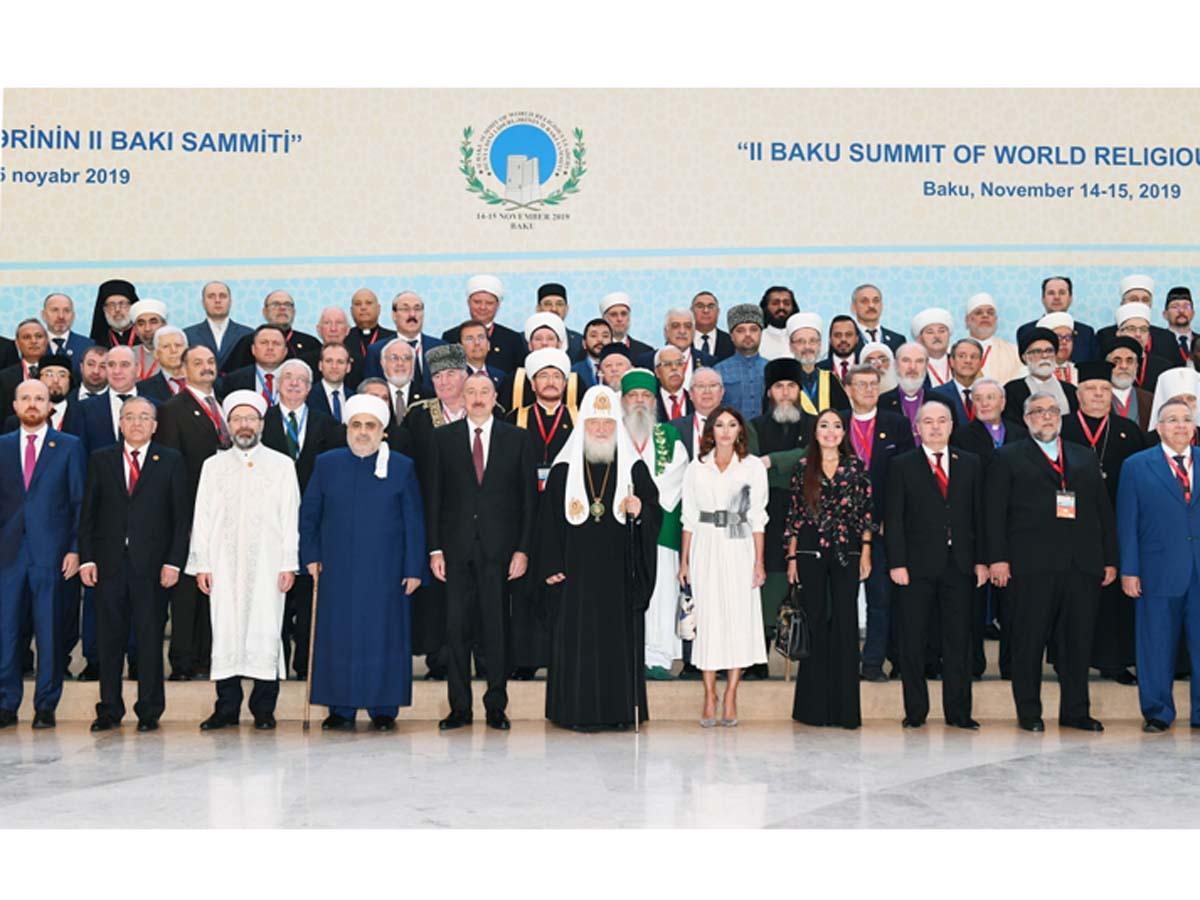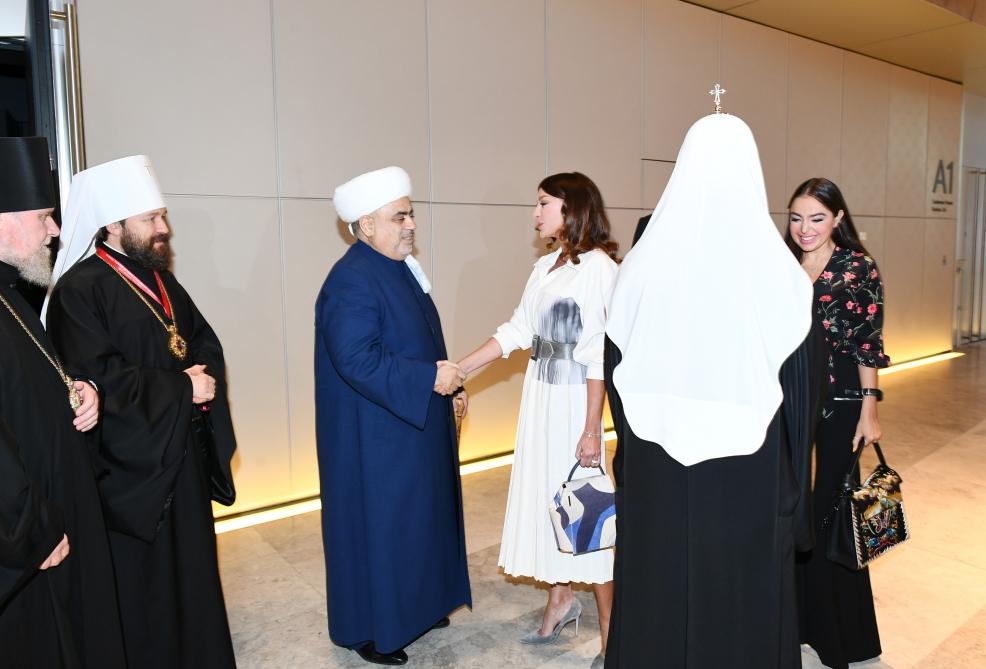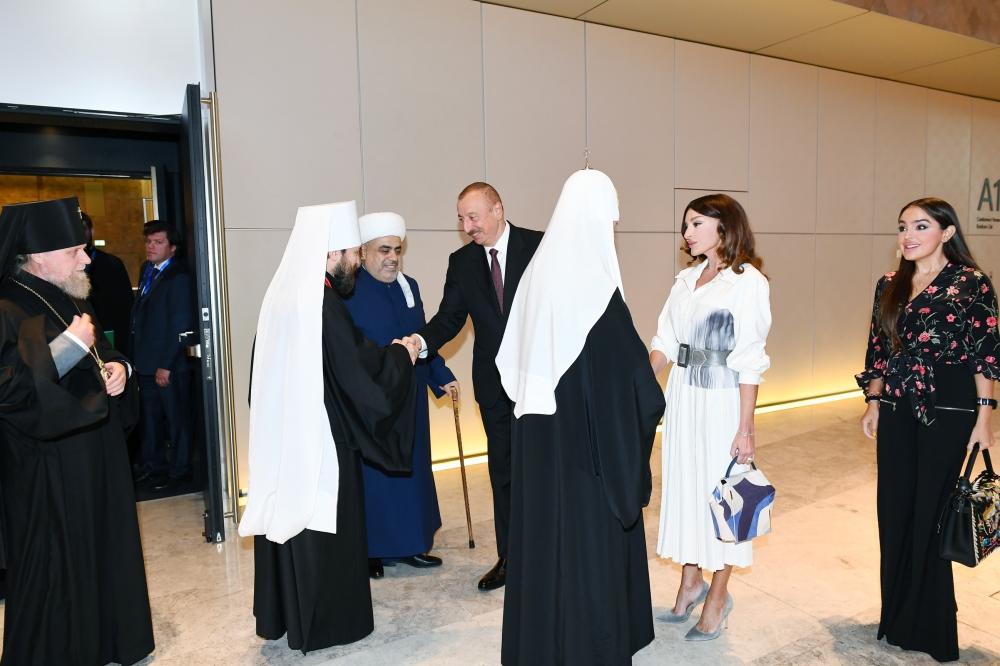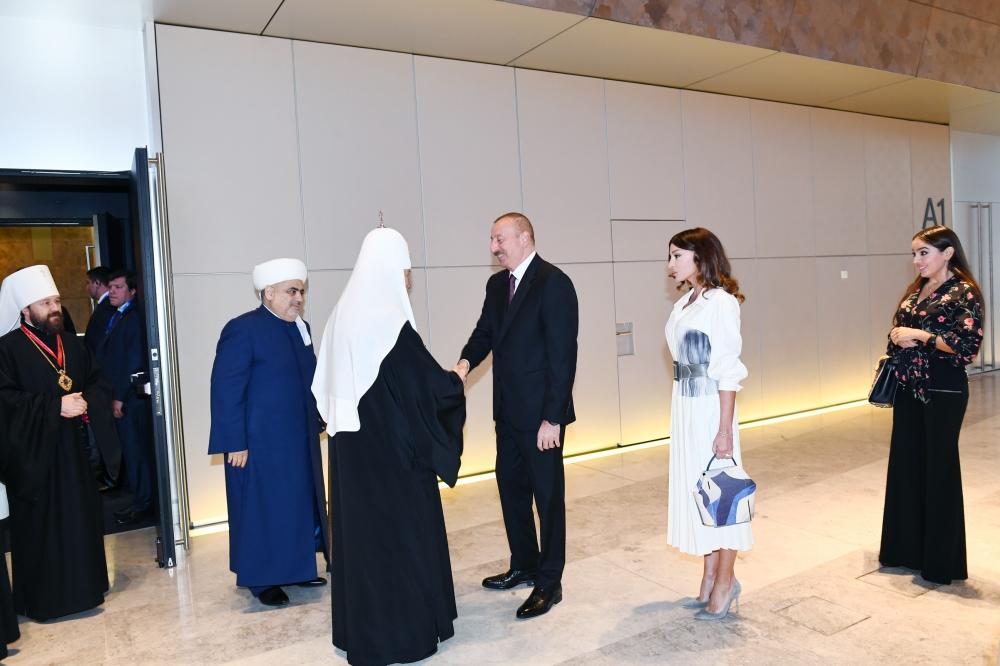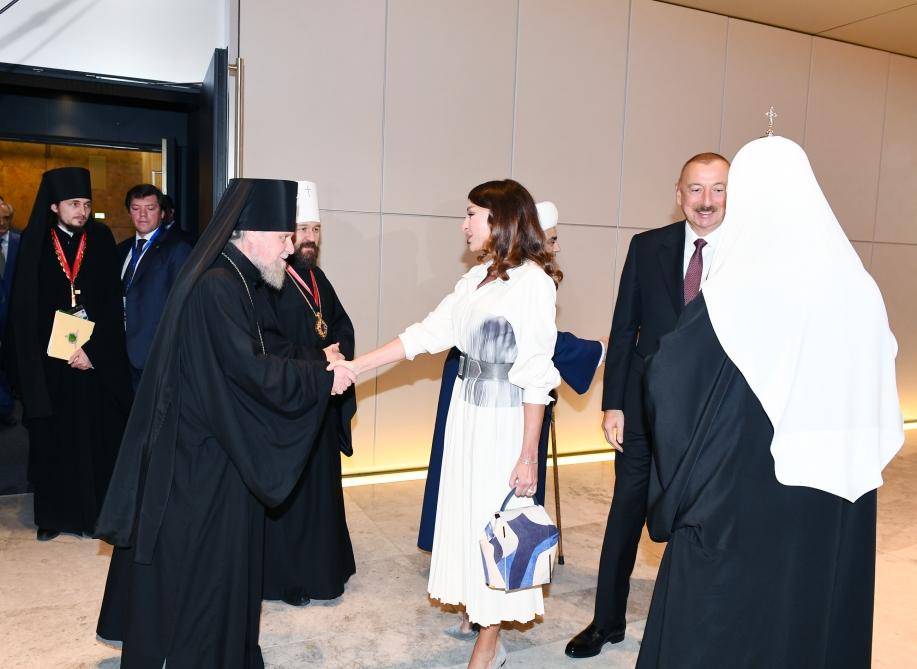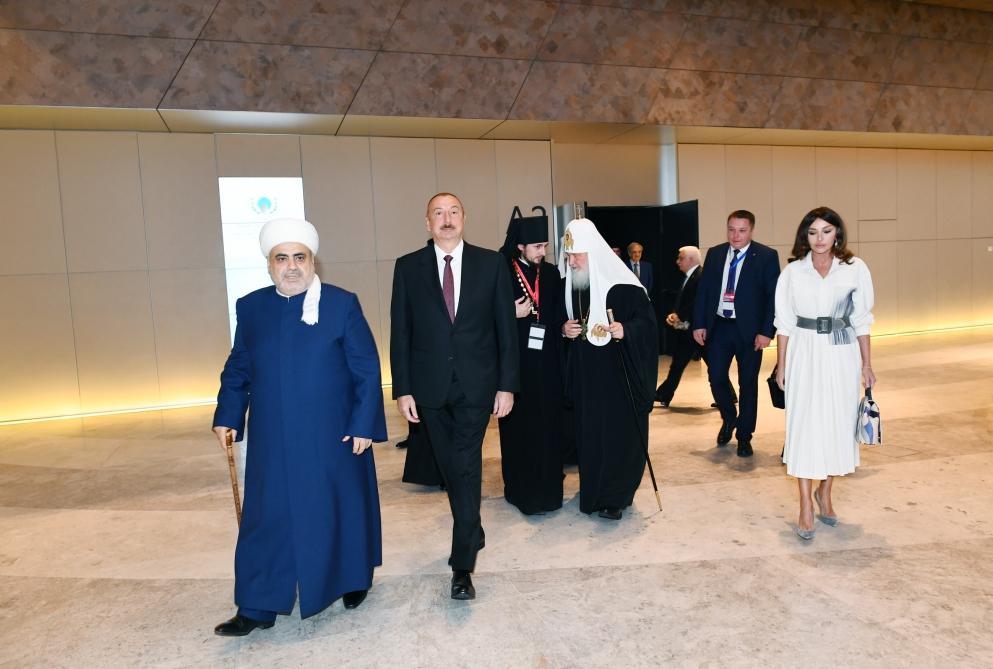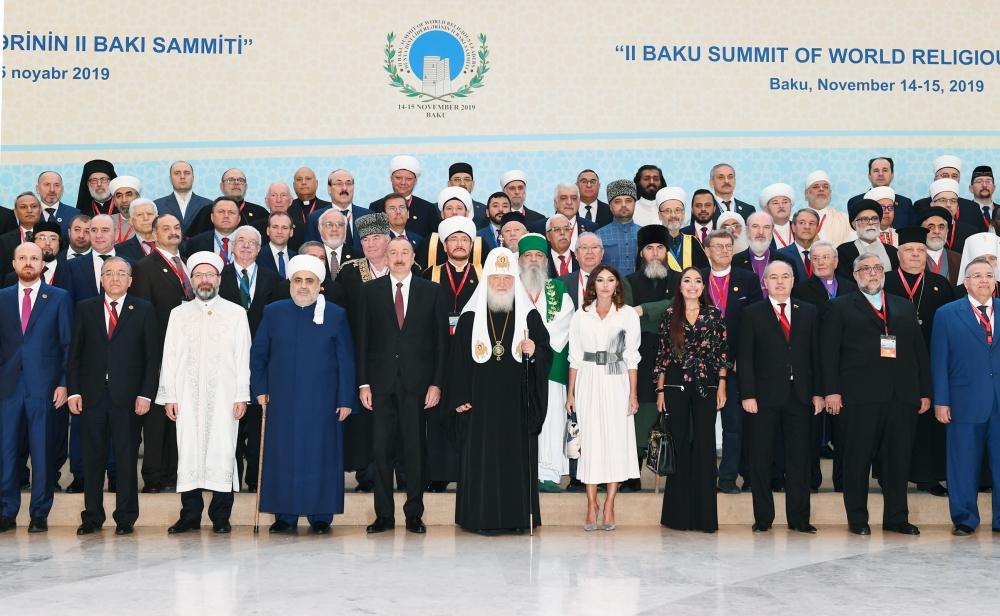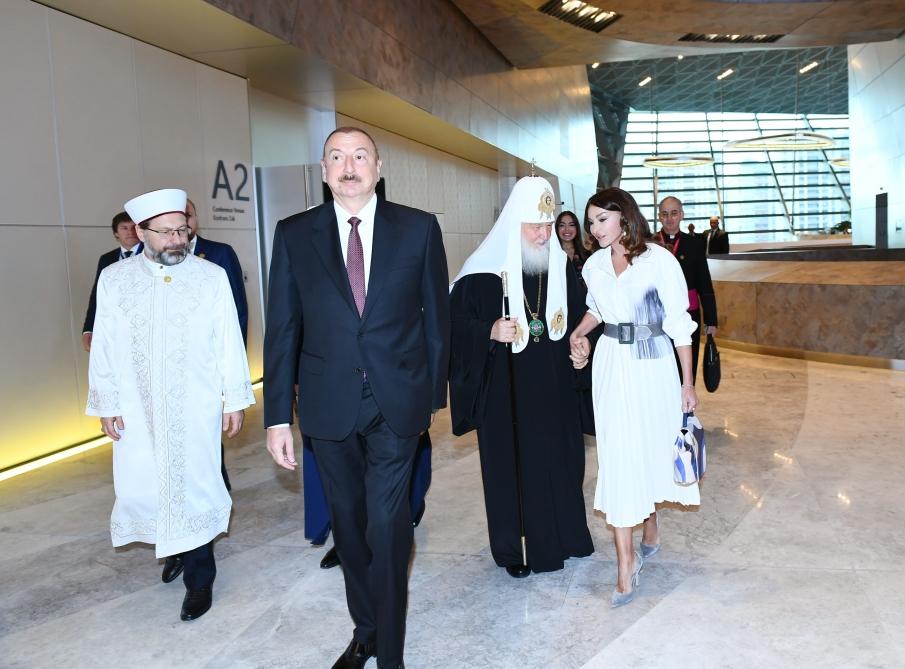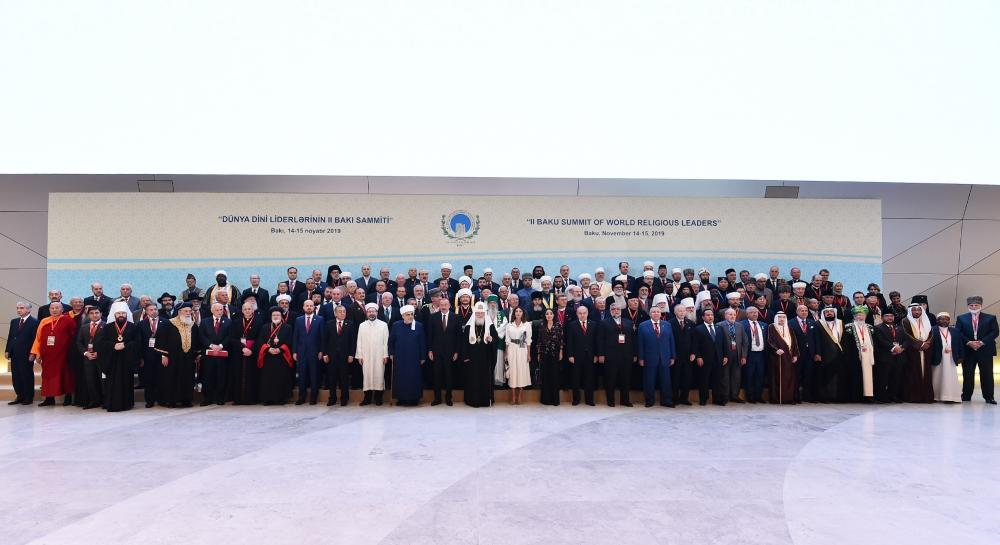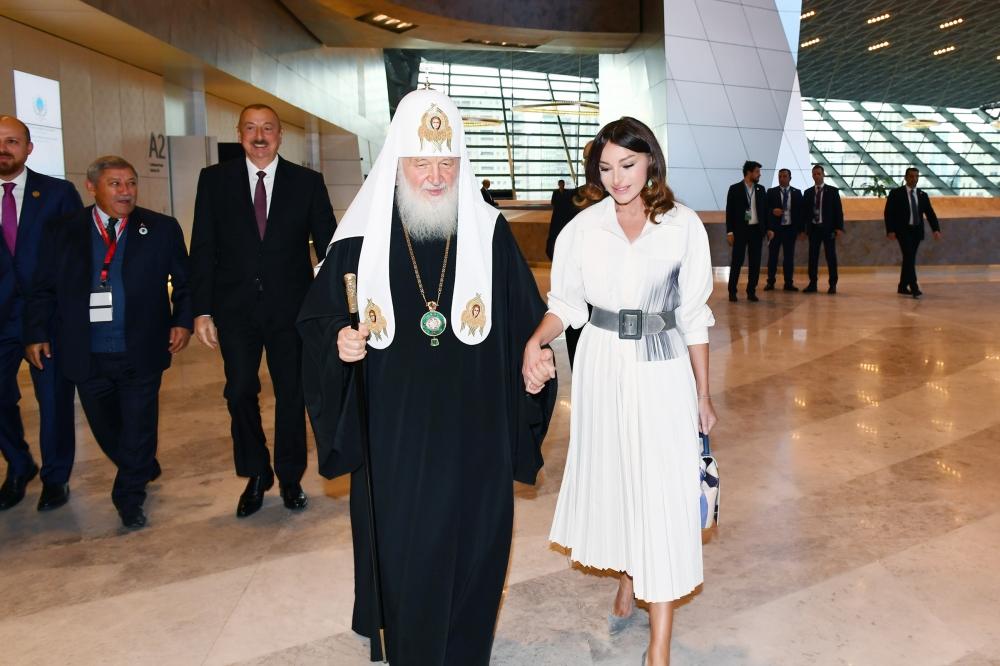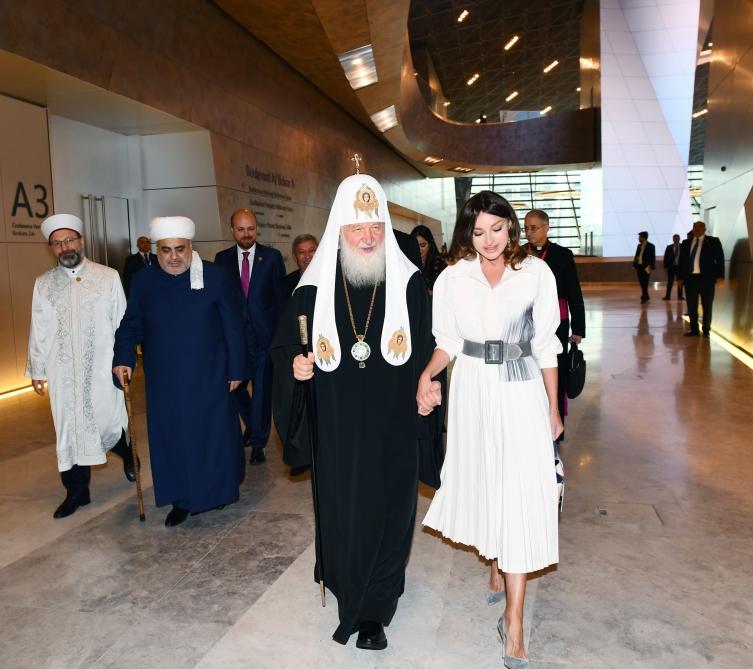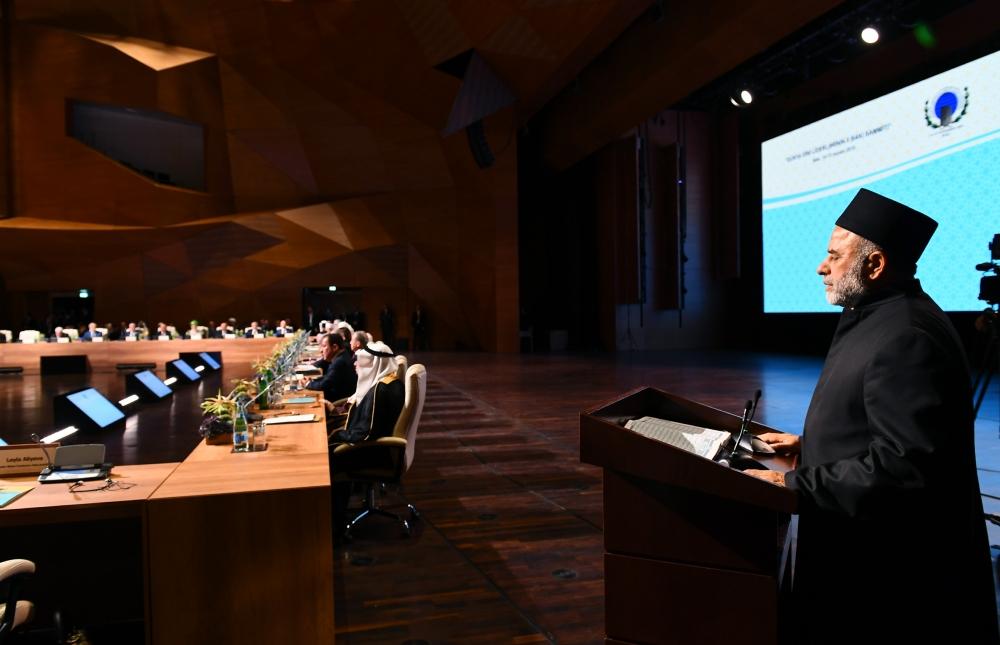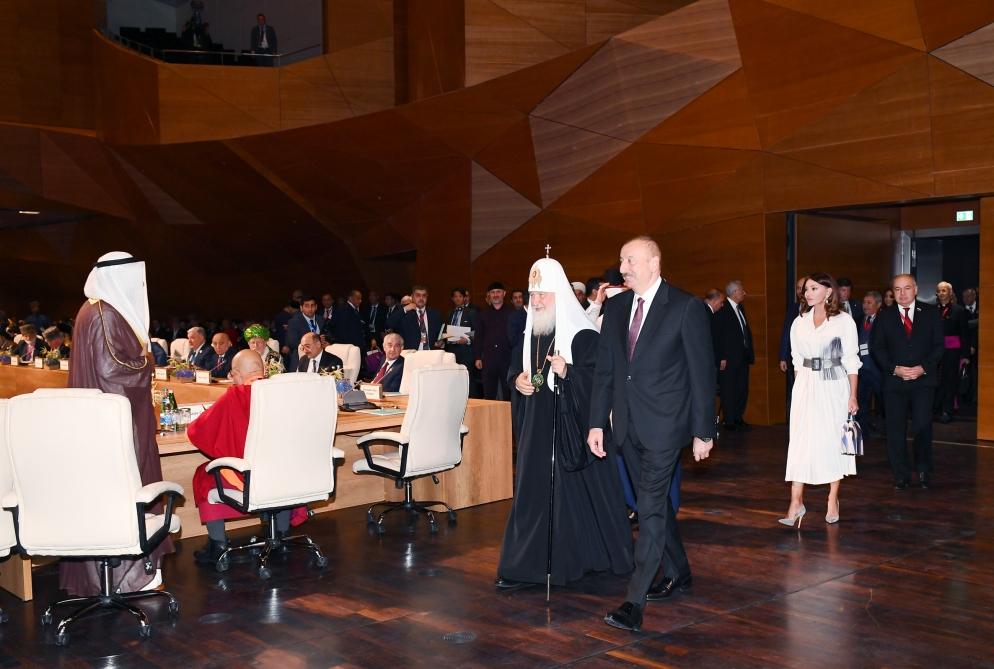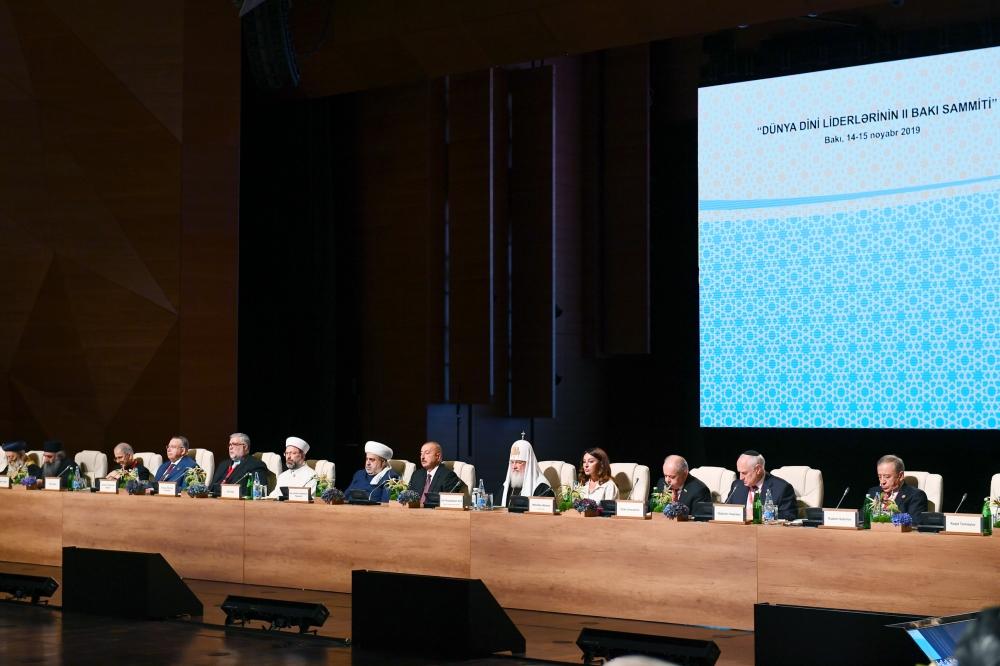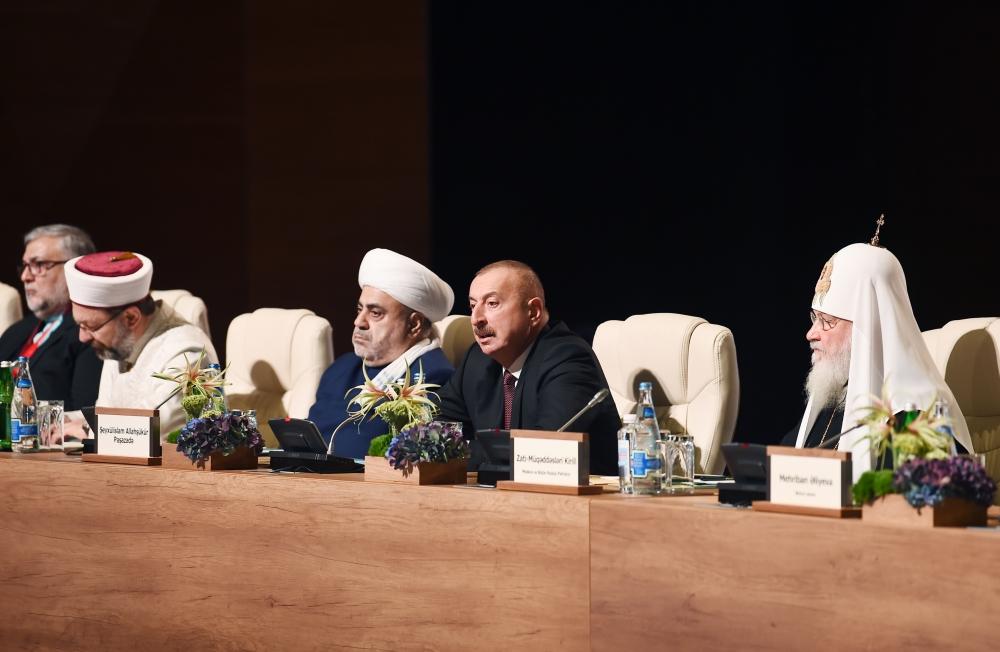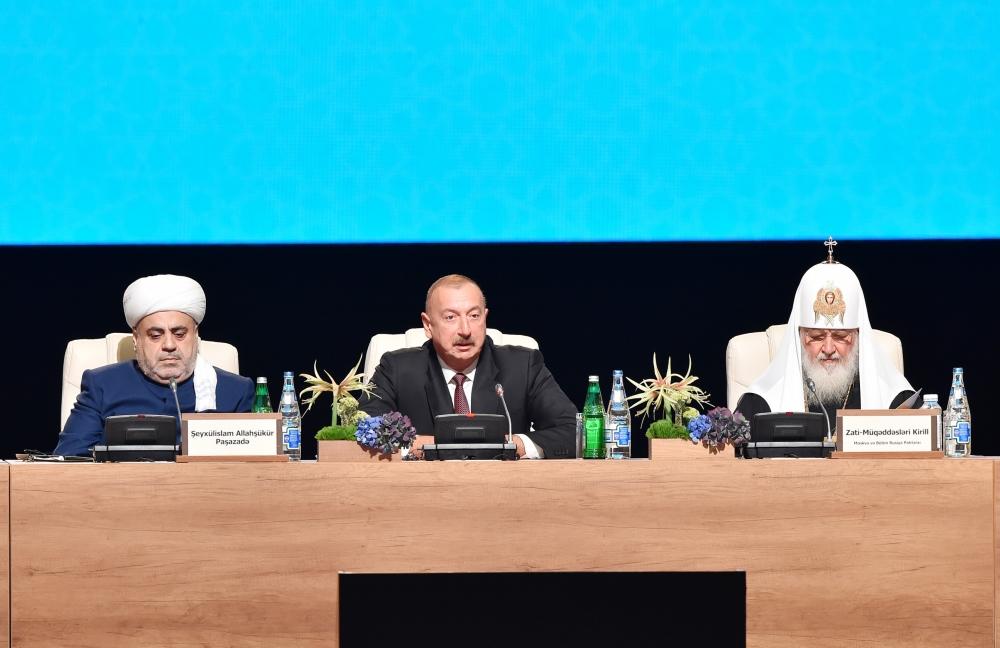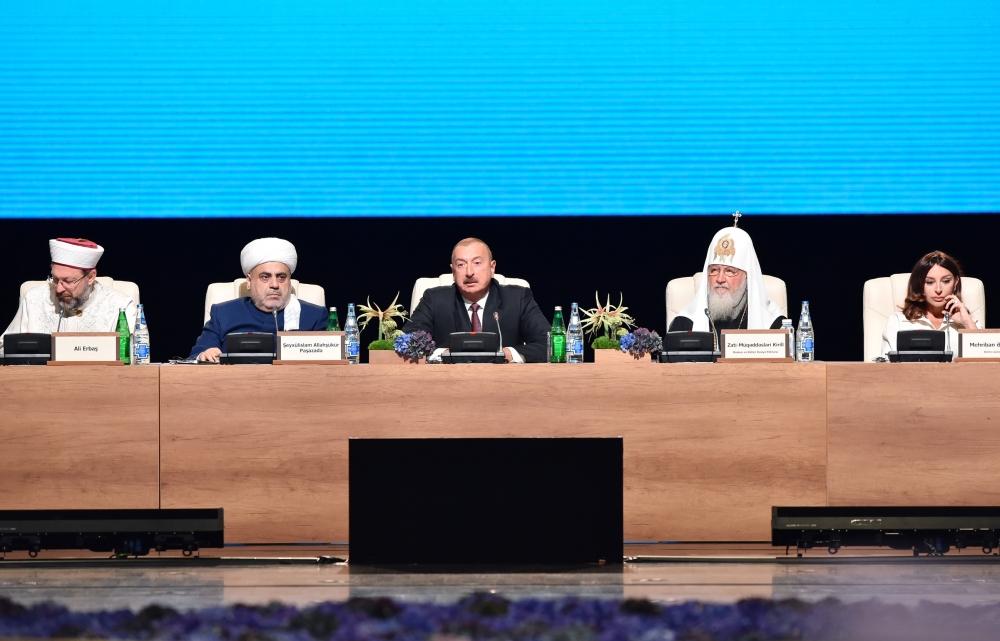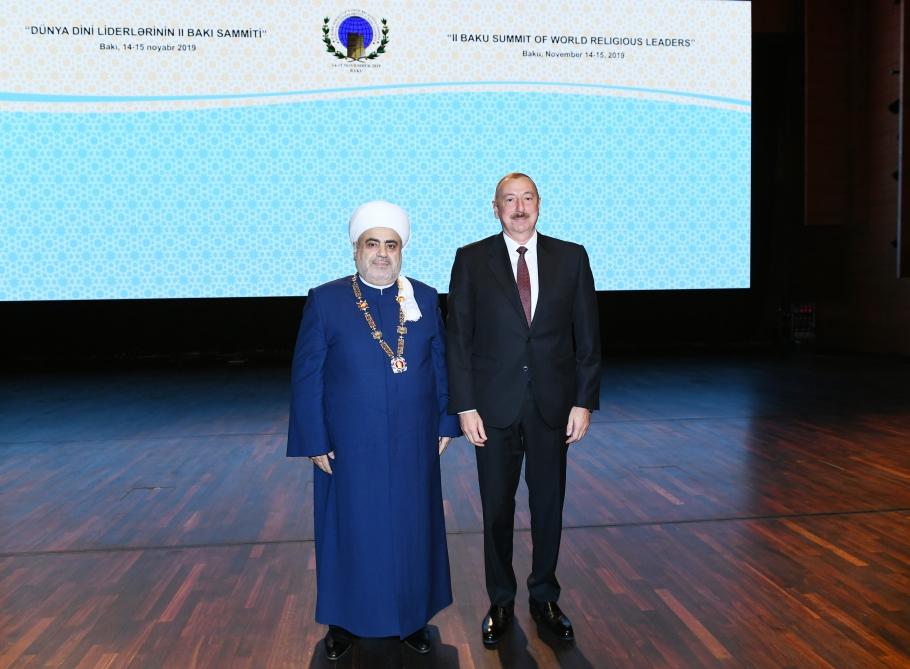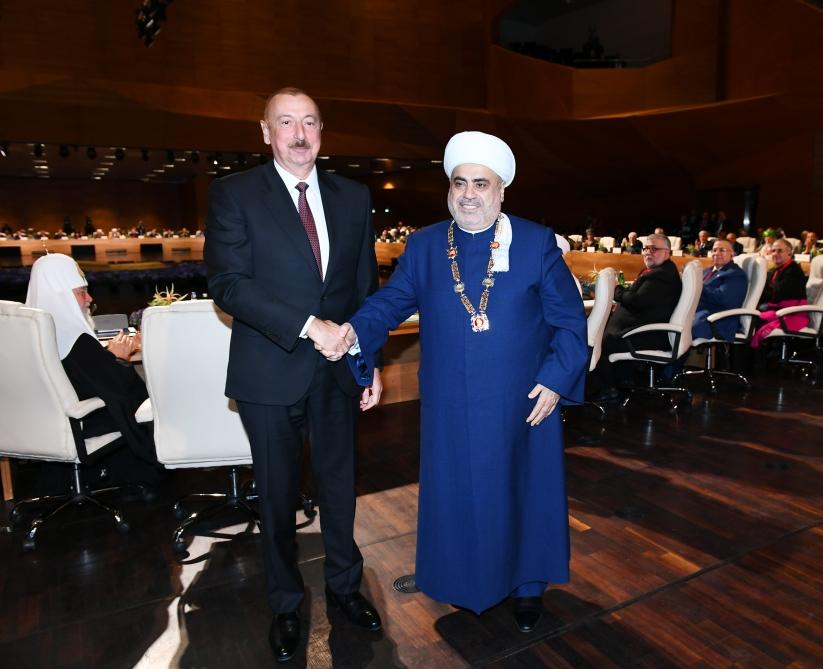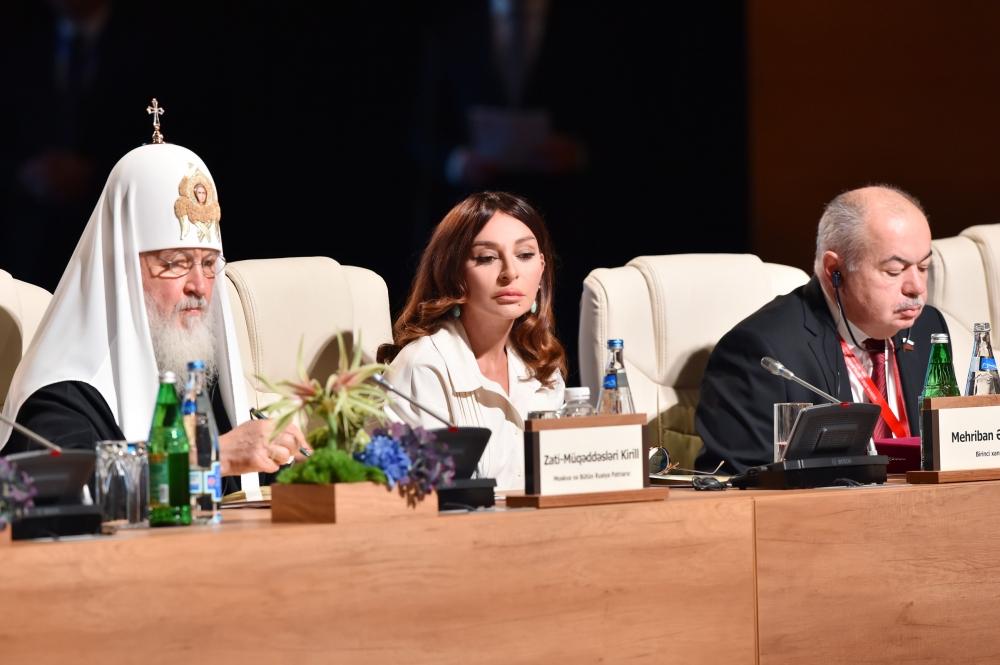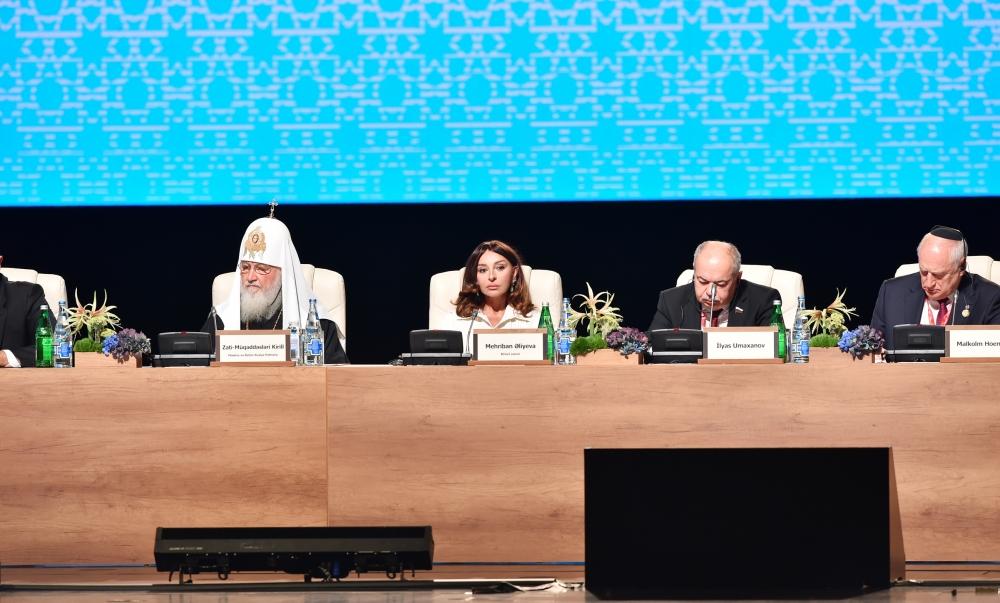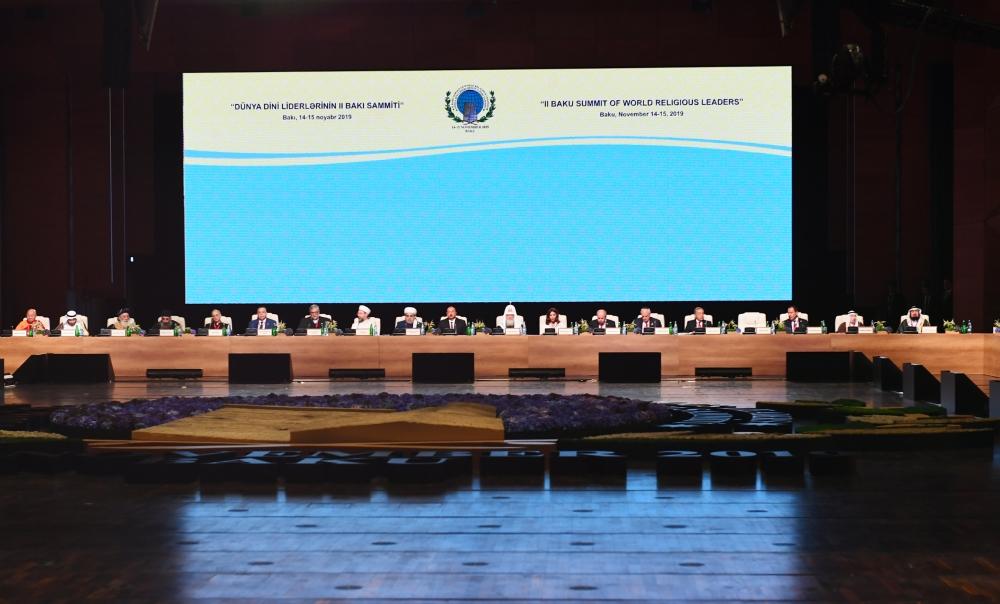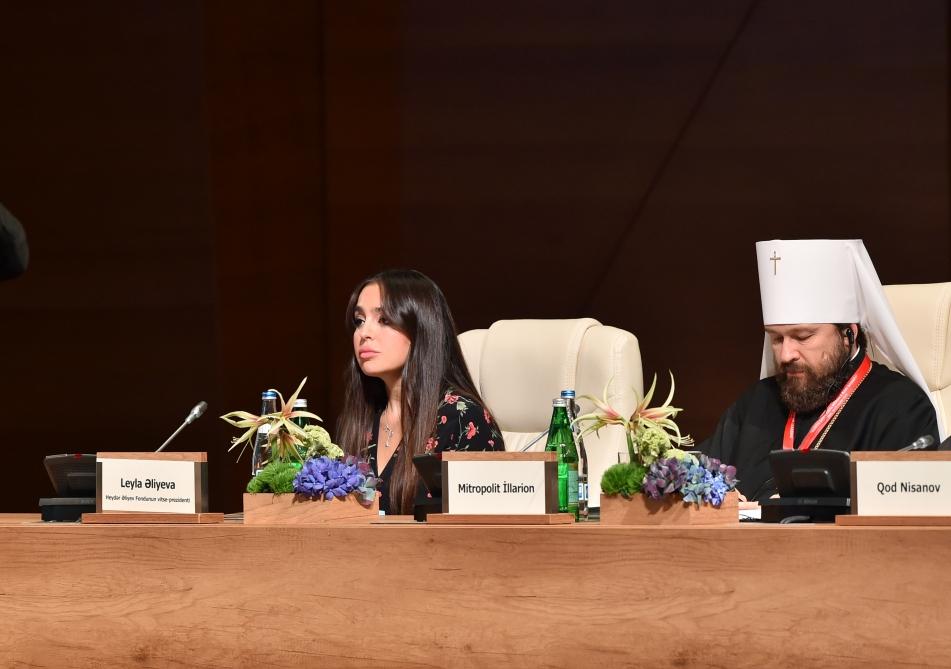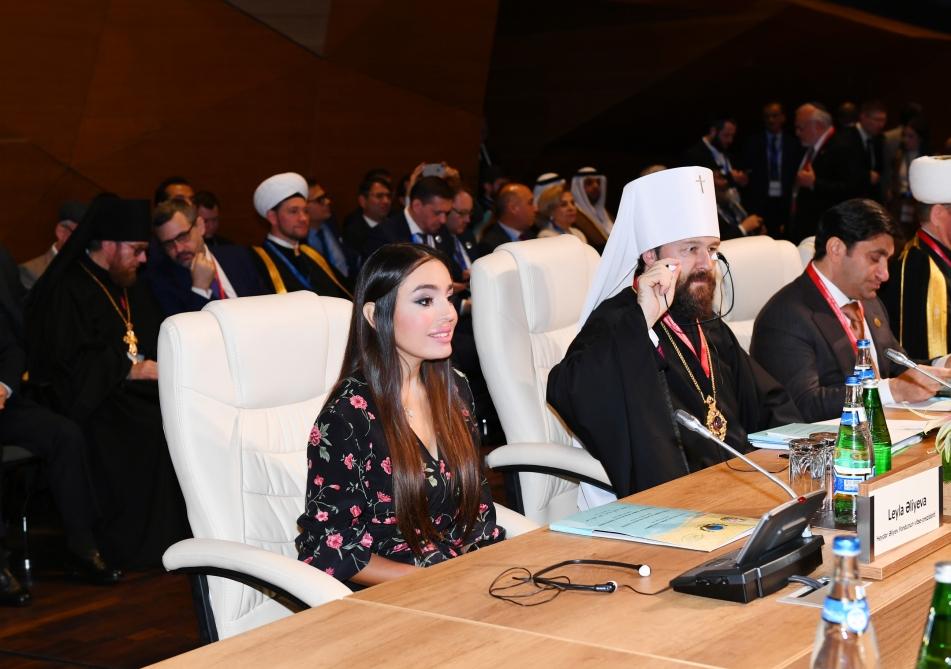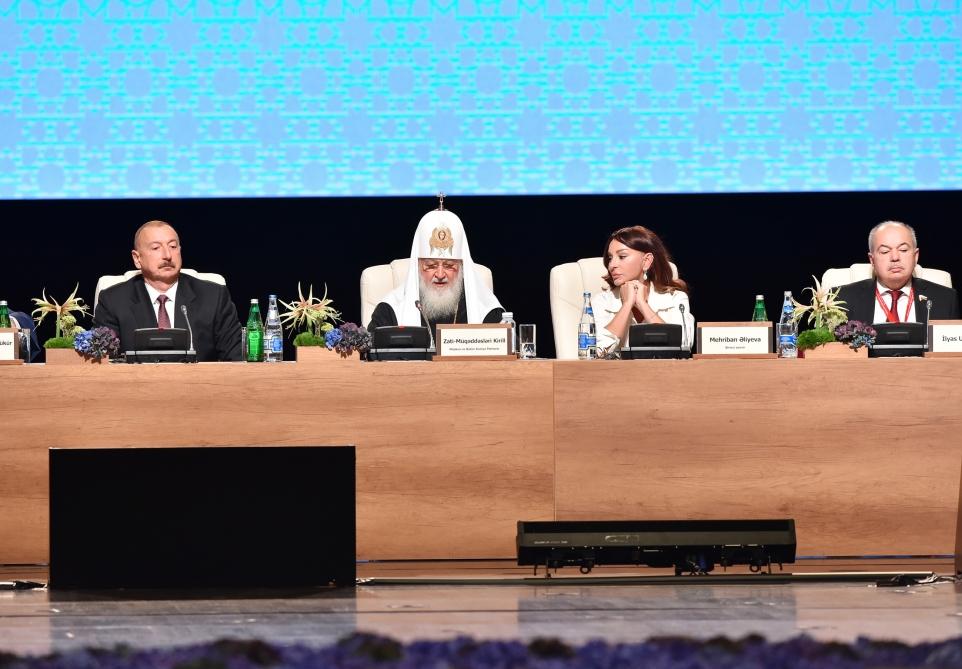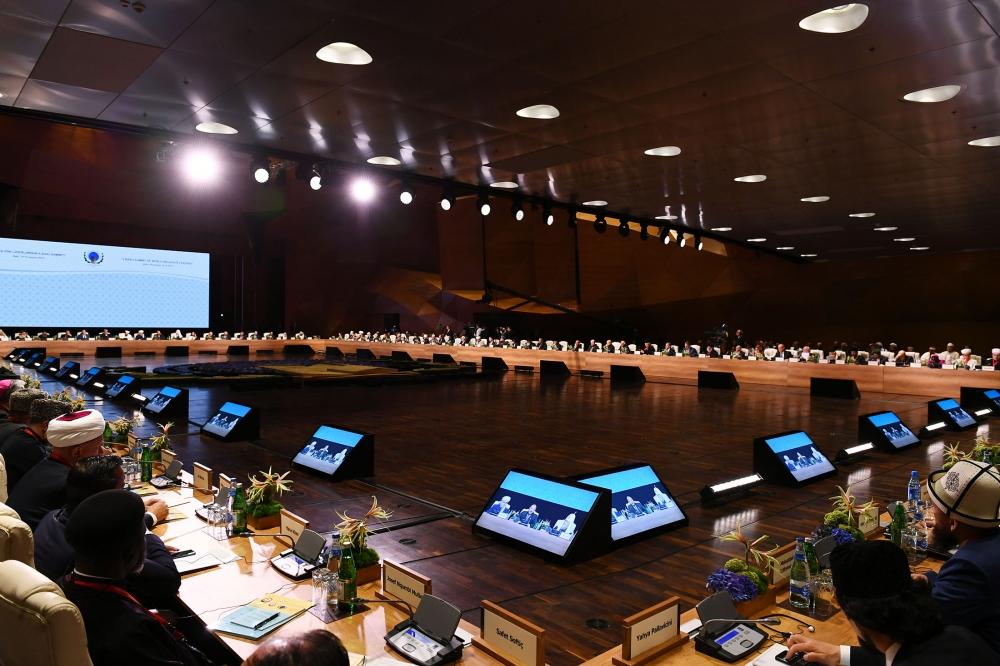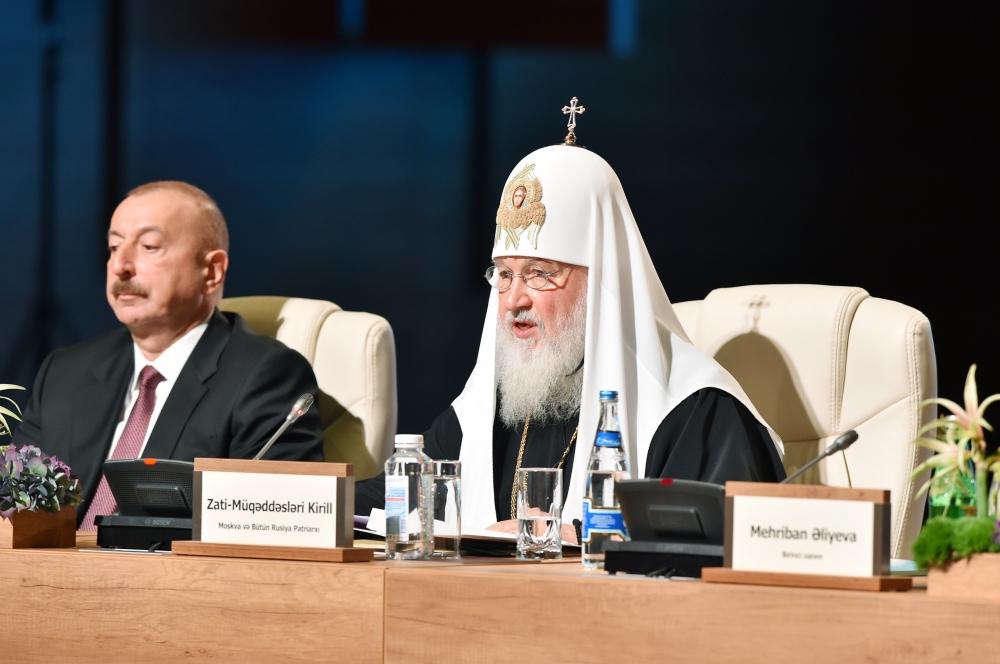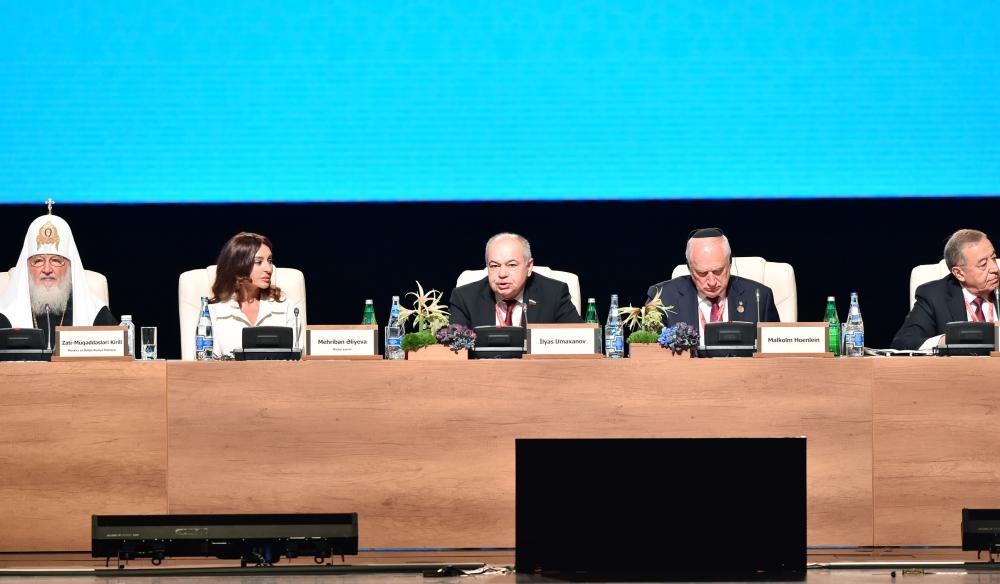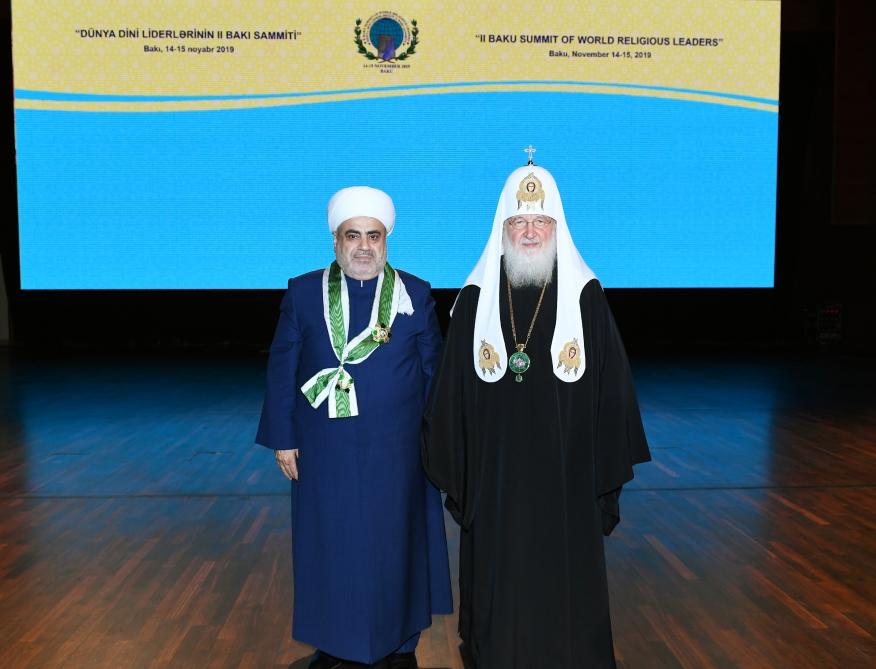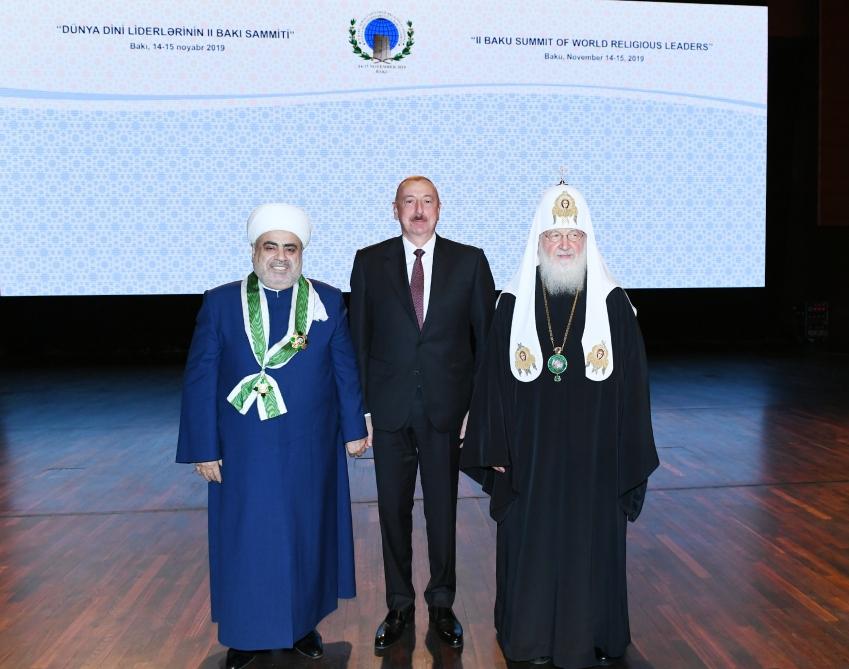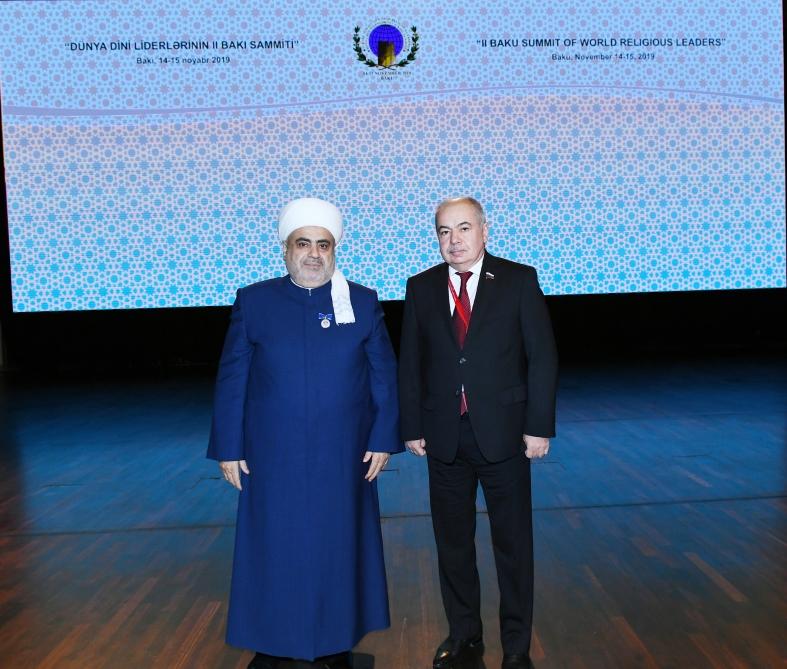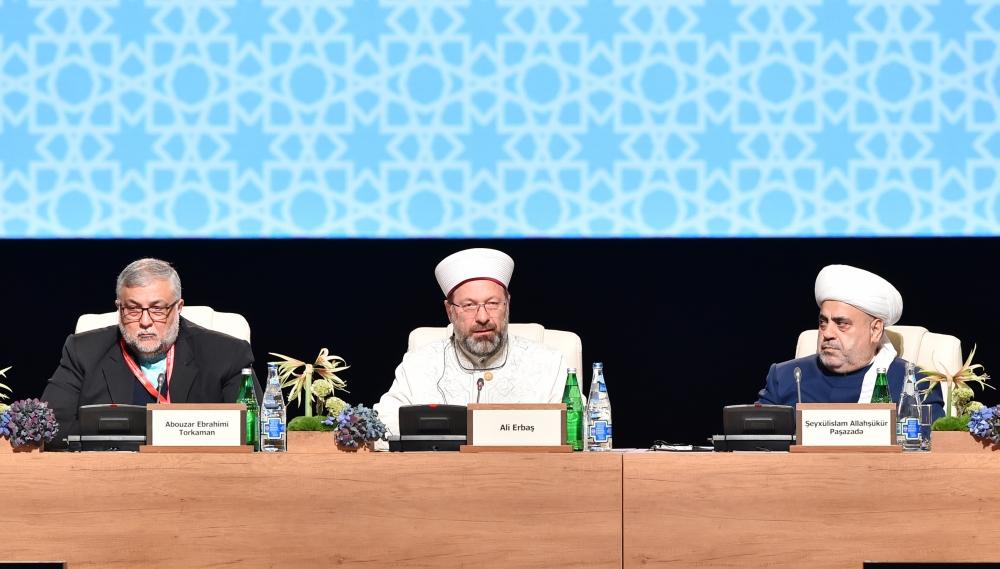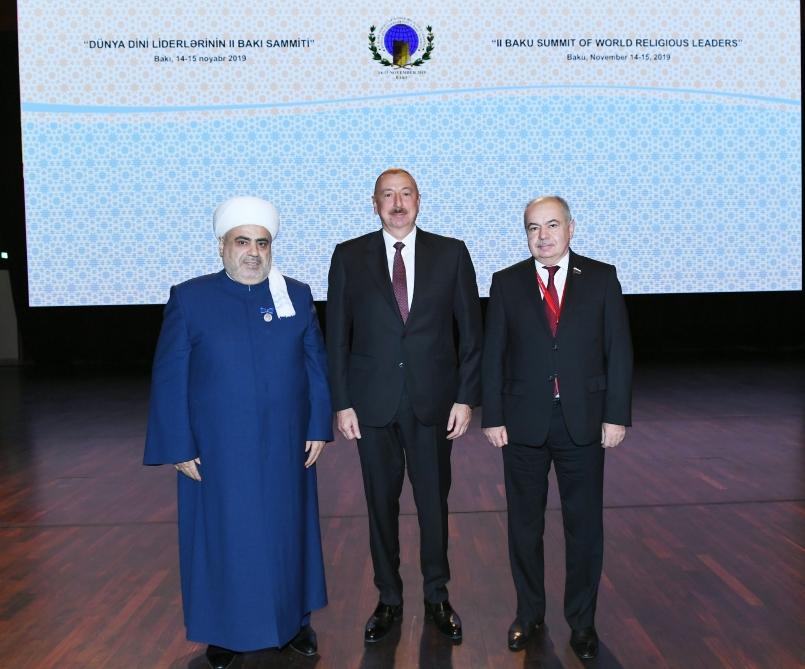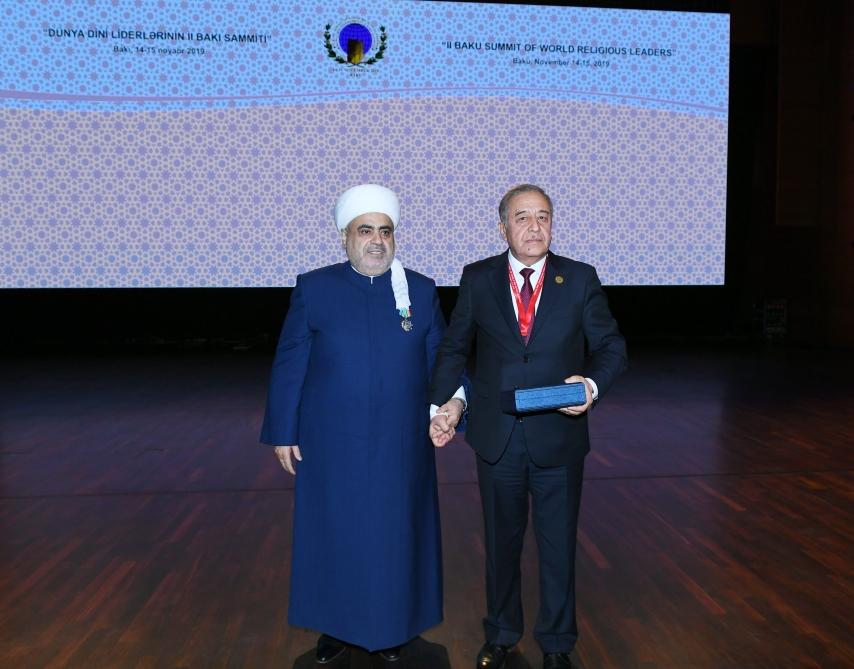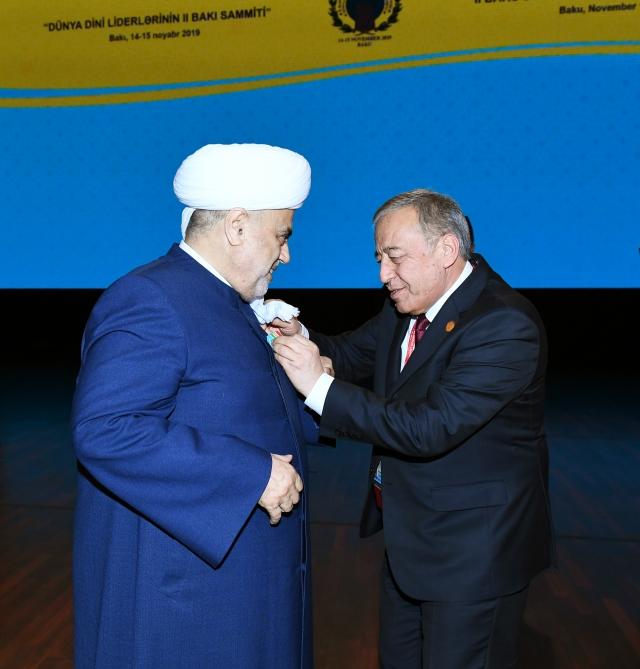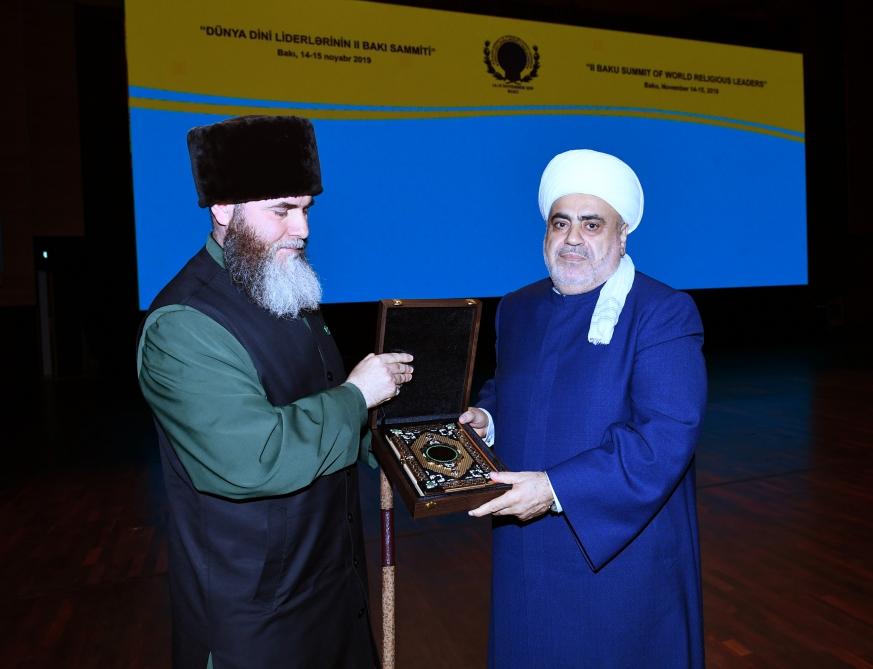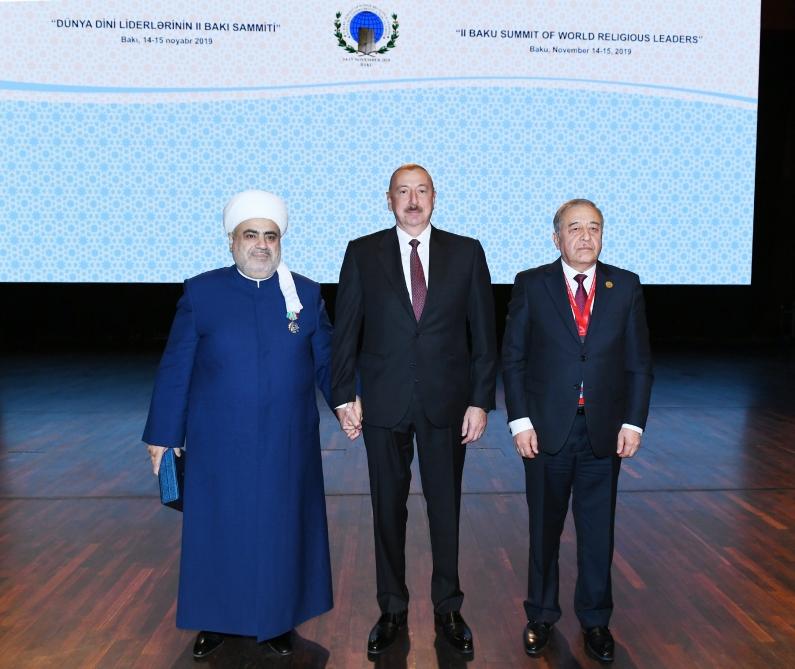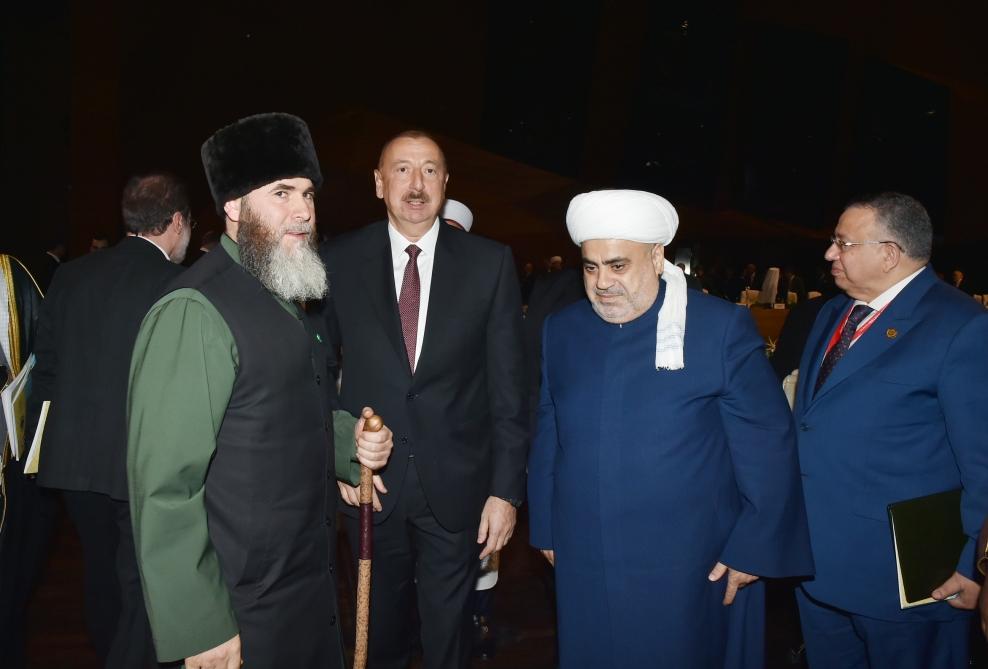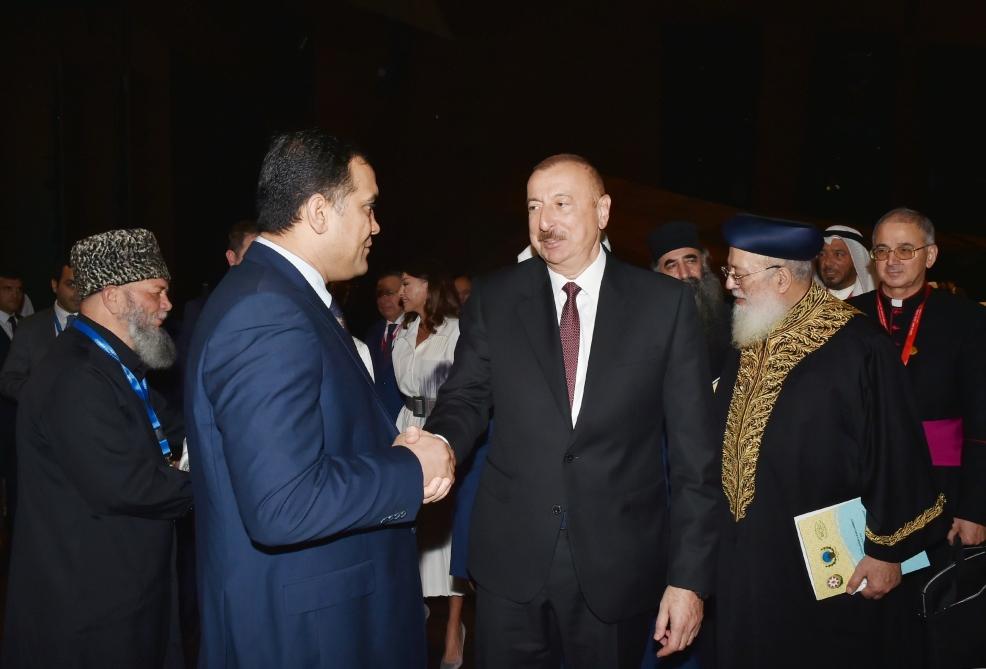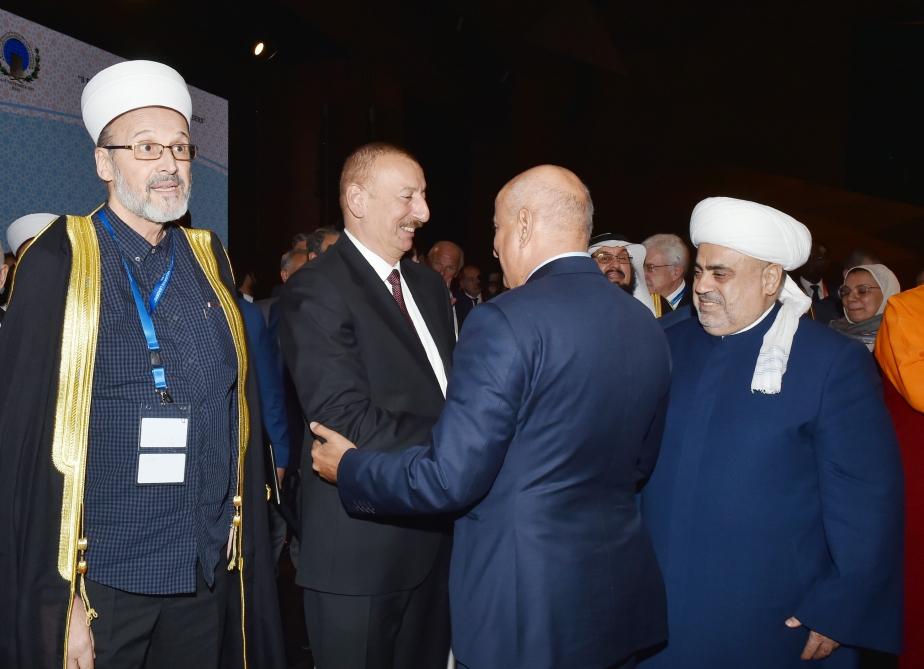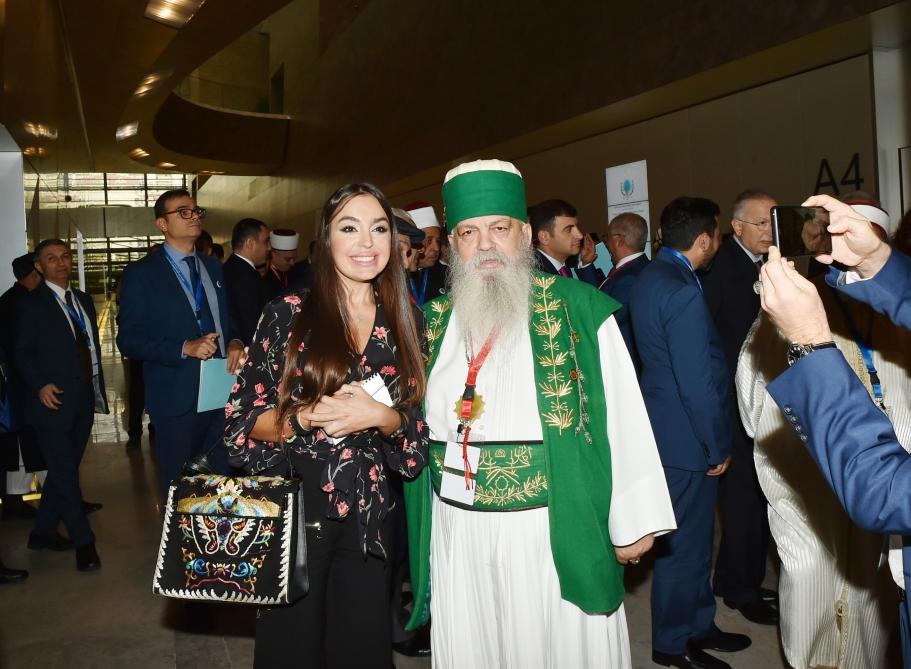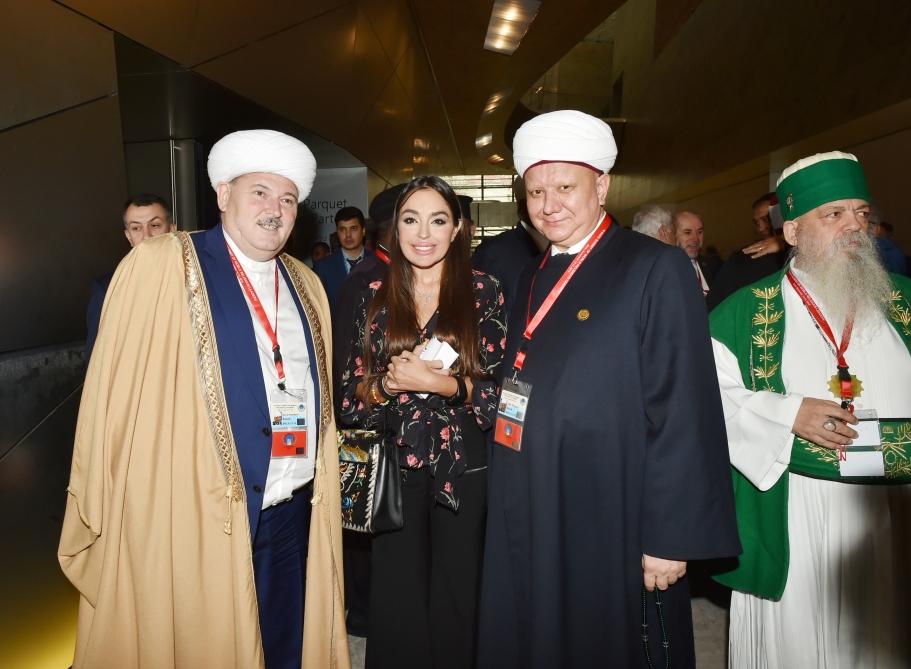BAKU, Azerbaijan, Nov. 14
Trend:
The 2nd Summit of World Religious Leaders has today kicked off in Baku.
President of the Republic of Azerbaijan Ilham Aliyev, first lady Mehriban Aliyeva and their daughter Leyla Aliyeva attended the opening ceremony of the Summit.
Prior to the Summit, a joint photo was taken.
The event started with the recitation of verses from the holy Quran.
President Ilham Aliyev made a speech at the Summit.
Speech by President of the Republic of Azerbaijan Ilham Aliyev
- Your Holiness Sheikhulislam Allahshukur Pashazade,
Your Holiness Patriarch Kirill of Moscow and All Russia,
Dear religious figures, guests, ladies and gentlemen!
I cordially greet all the guests. I want to say to all the guests participating in the 2nd Summit of World Religious Leaders - "Welcome!"
This international event is of great importance. We are proud that Azerbaijan is hosting this authoritative event for the second time. This testifies once again that Azerbaijan is playing and will continue to play an important part in the development of intercultural dialogue.
I consider it natural that such an authoritative event is being held in Baku because Azerbaijan has ancient interreligious traditions. Irrespective of the public and political system, Azerbaijan has always proved to be an exemplary country in this regard. Representatives of all religions, all ethnic groups have lived in our country for centuries like one family in peace, friendship, and mutual understanding. Azerbaijan is a multi-faith and multiethnic country, which is our greatest asset. Religious and ethnic diversity is our greatest asset. All the steps Azerbaijan has taken to achieve successful development and stability are underpinned by religious and national tolerance and multicultural values. Our ancient history is reflected also in our religious monuments. First of all, they are evidence that Azerbaijan is an ancient land. On the other hand, they show that at different times, representatives of various religions lived, created and left a wonderful historical heritage in Azerbaijan. I should note that we are proud that one of the oldest mosques in the Islamic world is located in Azerbaijan. The Shamakhi Juma Mosque was built in 743, and a few years ago it was thoroughly renovated. This is the oldest mosque in the Caucasus after the Derbent Mosque.
At the same time, not far from another historic Azerbaijani city of Sheki, there is a church of an ancient state - Caucasian Albania. This church has a great history. It is one of the oldest churches in the Caucasus. There is a temple of fire worshipers, Atashgah, in Baku. This indicates that Zoroastrianism has ancient roots in Azerbaijan. Subsequently, Russian Orthodox churches, synagogues and the Catholic Church were built in our country. I should also note that the Azerbaijani state is making every effort to protect our historical and religious monuments and build new religious temples. With the financial support of the Azerbaijani state, all religious churches were overhauled or rebuilt. Thus, inter-religious dialogue has an ancient history, and the modern state of Azerbaijan is committed to these traditions. We are faithful to Islam. We are promoting our religion, but representatives of all religions live and work freely in Azerbaijan, and celebrate their religious rituals. So there is a great public atmosphere in our country.
International organizations, as well as religious leaders of the world, appreciate the activity of Azerbaijan in this direction. His Holiness Patriarch Kirill of Moscow and All Russia, who has repeatedly visited Azerbaijan, Pope of Rome Francis, who has visited Azerbaijan, and the leaders of the Organization of Islamic Cooperation always said that inter-religious dialogue in Azerbaijan was organized at a high level. These words, this high mark are of great value to us, they reflect reality.
Azerbaijan is a country that has built its development and future on national roots. Traditional values are our greatest asset. We are very pleased that the younger generation in Azerbaijan is being educated in the national spirit, the spirit of patriotism and, at the same time, on the basis of traditional values. I believe that this will be one of the themes of the Baku Summit, because we are seeing that a campaign is being waged in the world, in different parts of the world, against traditional values, they are being tarnished, new “values” are being instilled that are alien to us and do not correspond to our national thinking. We must protect ourselves, especially the younger generation, from this alien and negative influence. Therefore, I believe that we all should promote traditional values, family values. I repeat that the policy pursued in Azerbaijan in this direction, the policy pursued by both the state and religious leaders, deserves, as it seems to me, the highest praise.
Azerbaijan is one of the countries promoting the values of multiculturalism. Multiculturalism is a way of life and a state policy in Azerbaijan. It is no coincidence that very important steps have been taken in this direction in Azerbaijan, and a number of authoritative international events have been held in our country. Some events are traditional in nature. For example, the Baku Humanitarian Forum is now a tradition. The World Forum on Intercultural Dialogue is receiving UN support, the Global Forum of the United Nations Alliance of Civilizations, the Summit of World Religious Leaders. So all these events pursue one goal – to strengthen inter-religious dialogue, together fight against religious discrimination, promote multicultural values and thus contribute to the positive processes taking place in the world because we can clearly see and follow in the media that numerous negative facts, conflicts, confrontations, wars and bloodshed occur on religious and ethnic grounds. Unfortunately, crimes are sometimes committed under pseudo-religious slogans. We need to consolidate our efforts in this direction.
The relations between the state and religion in Azerbaijan are regulated at a high level. The basis of these relations was laid by great leader Heydar Aliyev. Heydar Aliyev as the great son of the Azerbaijani people served the people with dignity at all times – both in the Soviet period and in the years of independence. It was Heydar Aliyev who laid the foundation of the relations between the state and religion. Also, the concept of Azerbaijan’s development in all other areas is associated with his name. In 1991, Azerbaijan gained state independence but in the first two years our independence was of formality nature. It is possible to say that the country was in an uncontrollable state. In particular, as a result of the military coup carried out by the Popular Front of Azerbaijan in 1992, the situation became even worse and Azerbaijan found itself in the grip of a deep crisis, chaos, anarchy and arbitrary rule. At the same time, great damage was caused to inter-religious and ethnic relations. The government of the Popular Front of Azerbaijan is a black spot in our history. This is a shameful period, and it is no coincidence that the Azerbaijani people could only endure this anti-national, venal and cowardly government for only one year. A year later, they turned to Heydar Aliyev and invited him to take power, entrusted him with the future of the country.
After coming to power, Heydar Aliyev first took important steps to disarm the illegal armed groups and prevent Armenian occupation, and Azerbaijan was able to return some of the lands that were occupied. Stability was established in the country and it embarked on a path of development. We managed to overcome international isolation and the implementation of economic and political reforms began. The establishment of relations between the state and religion is also associated with the name of Heydar Aliyev. At the same time, His Holiness Sheikh showed great dedication and carried out active work in this direction. As a witness to all this, I can say that the friendship of Heydar Aliyev and His Holiness Sheikh played a decisive role in the formation of the relations between the state and religion. His Holiness Sheikh is still doing a lot of hard work to continue the relations between the state and religion on a healthy basis and promote Azerbaijan in the world. The work carried out under his leadership is highly appreciated by both the Azerbaijani people and the world community. Every year, on the initiative and under the leadership of His Holiness Sheikh, authoritative international events are held in several countries. His Holiness Sheikh, who has gained high authority in Azerbaijan, in the Caucasus and in the world, carefully thinks through the steps being taken to regulate the relations between religion and the state. These steps support the overall development of our country because stability of any country means its future. Where stability is compromised, there is no room for development. Unfortunately, riots, wars and religious conflicts have occurred in various countries in recent years. Unfortunately, heinous crimes are often committed under religious slogans.
His Holiness Sheikh is one of the outstanding people who have made a huge contribution to the overall development of Azerbaijan. In August of this year, on my Order, His Holiness Sheikh was awarded the highest order of Azerbaijan – the Order of Heydar Aliyev, and this high award will be presented to His Holiness Sheikh in such a festive atmosphere today.
As for interreligious relations, I believe that the range of these relations is quite broad. Looking at the general concept in Azerbaijan, we see several directions, which means more than just contacts of religious leaders with each other. This also includes the hosting of various events and the communication of important messages. Among these events, I want to note the First European Games and the Fourth Islamic Solidarity Games held in Azerbaijan several years ago. Although this is a sporting event, they are of great political importance because, just imagine, athletes from Islamic and European countries competed and, at the same time, established friendly relations with each other in the same city in the course of two years. These games are not just sporting events. They have turned in Azerbaijan into a festival of friendship, a celebration of friendship. More than 100 countries were represented at both competitions, thousands of athletes, coaches and visitors participated, and, of course, these games played a major role in encouraging interreligious and intercultural dialogue.
Last year, we celebrated the 10th anniversary of the “Baku Process”. The “Baku Process” began on our initiative and today it enjoys wide international support. The UN perceives the “Baku Process” as an important platform for interreligious and intercultural dialogue. In 2008, a meeting of the Council of Europe’s ministers of culture was held in Baku, and we decided to invite the ministers of culture of the countries of the Organization of Islamic Cooperation to this meeting. This is how the first contacts appeared. Following this, in 2009, we invited European ministers to a meeting of culture ministers of members of the Organization of Islamic Cooperation in Baku. Azerbaijan is one of a handful of countries participating in both the Organization of Islamic Cooperation and the Council of Europe, and taking this opportunity we launched the “Baku Process”. As I have already noted, the “Baku Process” is highly appreciated today and represents a truly unique format of cooperation.
Speaking of inter-religious dialogue, of course, we should not be content with merely stating positive aspects. We must also strongly condemn attempts to link conflicts with the religious factor. One such example is the Armenia-Azerbaijan Nagorno-Karabakh conflict, which has been going on for many years. It should be noted that Nagorno-Karabakh is the original and historical Azerbaijani land. For centuries, the Azerbaijani people lived and worked on this land. All place names in the territory related to Nagorno-Karabakh on old maps, including maps printed by tsarist Russia at the beginning of the 20th century, are of Azerbaijani origin. The Karabakh Khanate was an Azerbaijani Khanate. At the beginning of the 19th century, Armenians were simply resettled to Nagorno-Karabakh, and in the 20th century the national composition there was largely changed. I must also emphasize that if we talk about maps drawn between the republics after the Bolshevik revolution, the Bolshevik government decided at that time to preserve Nagorno-Karabakh as a part of Azerbaijan. This is a very important point, because Armenian historians, who are masters in distorting history, claim that the decision was made to transfer Nagorno-Karabakh to Azerbaijan. Everything was completely different at the time and historical documents confirm that. The decision was made to preserve Nagorno-Karabakh as a part of Azerbaijan. In other words, it simultaneously reflects historical and political aspects.
However, on the eve of the collapse of the Soviet Union, the nationalist forces that had emerged in Nagorno-Karabakh and Armenia unleashed aggression against Azerbaijan. As a result of military aggression, 20 percent of our lands, including Nagorno-Karabakh and seven adjacent districts, were occupied. Genocide against the Azerbaijani people was committed in these territories, Armenians destroyed all our historical monuments and graves, including mosques. The UN Security Council has adopted four resolutions in connection with the conflict, which contain completely obvious provisions on the withdrawal of the Armenian armed forces from our lands, but Armenia ignores these resolutions. Other international organizations have adopted similar decisions and resolutions – the Non-Aligned Movement, the Organization of Islamic Cooperation, the European Parliament, the Council of Europe and other organizations. The only way to resolve the conflict is to restore the territorial integrity of Azerbaijan.
As a result of this terrible humanitarian disaster, one million Azerbaijanis from Nagorno-Karabakh, Armenia and the districts adjacent to Karabakh have become refugees and IDPs. At that time, the population of Azerbaijan was 8 million. That is, imagine how terrible a disaster it was. Despite this, Azerbaijan is developing successfully, our country has gained great authority in the international arena. The final declaration of the Summit of the Non-Aligned Movement held in Baku last month also reflects justice. It should be noted that Azerbaijan has taken over chairmanship of this large organization. From now on, over the course of three years, Azerbaijan will chair the Non-Aligned Movement by a unanimous decision of 120 countries.
Our economic performance is very positive. From 2003 to the present, the country's economy has increased 3.2 times, literacy is close to 100 percent, poverty has decreased from about 50 to 5 percent over the past 16 years. Azerbaijan attaches great importance to technological development and is now a member of the small club of space-faring nations. We have three satellites. Important transport projects are being implemented. They are not just transport but cooperation projects, because transport is an area in which neighboring and other countries of the region depend on each other. As a country without access to the world ocean, Azerbaijan has already become one of the international transport hubs – the East-West and North-South transport corridors pass through the territory of Azerbaijan.
All these achievements allow us the opportunity to say that our development will continue to be successful, our future will be bright and the main condition for a successful future is domestic stability. The Azerbaijani people, their opinion and support for us are the guarantor of this stability. The unity between the people and government is one of the key factors in the successful development of Azerbaijan. In addition, inter-religious relations increase our strength.
I am sure that the current Summit will be of great importance and the messages sent from Baku will find their addressees. I believe that one of the main areas is to prevent religious discrimination, attempts to use religion for political purposes, impart religious coloring to conflicts, destroy historical and religious monuments during conflicts, wage a joint struggle against xenophobia, Islamophobia, anti-Semitism and promote traditional values. I think that the issues I have noted reflect the policy of Azerbaijan in this direction. I am sure that the results of the Summit will be the next step in this direction.
I cordially greet the guests again and wish the Summit success. Thank you!
X X X
An Order by President Ilham Aliyev to award chairman of the Caucasus Muslims Office Sheikhulislam Allahshukur Pashazade with "Heydar Aliyev" Order was then read out.
President Ilham Aliyev presented “Heydar Aliyev” Order to Sheikhulislam Allahshukur Pashazade.
Chairman of the Caucasus Muslims Office Sheikhulislam Allahshukur Pashazade addressed the Summit.
Patriarch Kirill of Moscow and All Russia then made a speech at the event and handed Order of St. Most Reverend Seraphim of Sarov of Russian Orthodox Church to Sheikhulislam Allahshukur Pashazade.
Deputy Chairman of the Council of the Federation of the Federal Assembly of the Russian Federation Ilyas Umakhanov read out President Vladimir Putin’s letter to participants of the 2nd Summit of World Religious Leaders.
Head of Turkey’s Religious Affairs Directorate Ali Erbaş read out Recep Taayyip Erdogan’s letter to the event participants.
Other speakers at the event included Head of Culture and Islamic Communications organization of the Islamic Republic of Iran Abuzar Ebrahimi Turkaman, First Deputy Speaker of the House of Representatives of the Arab Republic of Egypt Al-Sayed Mahmoud Al-Sherif, and Adviser to the President of the Republic of Uzbekistan Rustam Kasimov.
Georgian Ambassador to Azerbaijan Zurab Pataradze read out President Salome Zourabichvili’s letter.
Mufti of the Chechen Republic of the Russian Federation Salah Mezhiyev read out Head of the Chechen Republic Ramzan Kadyrov’s letter.
Executive Vice Chairman/CEO of the Conference of Presidents of Major Jewish Organizations Malcolm Hoenlein, founding Secretary General of King Abdullah bin Abdul Aziz International Center for Interreligious and Intercultural Dialogue (KAICIID) Faisal bin Abdulrahman bin Muaammar, Chief Rabbi of Jerusalem Shlomo Amar, Special Adviser to the Secretary-General of the United Nations Abdullah Matouq Al-Matouq, head of the Karachay-Cherkessia Republic of the Russian Federation Rashid Temrezov then addressed the Summit.
Vicar of the Ilia II, Catholicos-Patriarch of All Georgia, Metropolitan Theodore read out the Patriarch’s letter.
Advisor on Judicial and Religious Affairs at the United Arab Emirates Ministry of Presidential Affairs Ali Bin Al Sayed Abdulrahman Al Hashim, secretary of the Commission for Religious Relations with Muslims and bureau chief for Islam at the Pontifical Council for Inter-Religious Dialogue Khaled Akasheh, Deputy Secretary-General of the Muslim World League (Rabitat Al-Alam Al-Islami) Abdul Aziz Sarhan then made speeches.
Chairman of the Caucasus Muslims Office Sheikhulislam Allahshukur Pashazade reiterated the importance of the Summit and thanked the participants for attending the event.
Held as part of the events organized on the 70th anniversary of Sheikhulislam Allahshukur Pashazade, the Summit brings together leaders and representatives of more than 70 countries, 25 traditional religions and religious sects from 5 continents, as well as about 500 high-level representatives from around 10 influential international organizations.
The two-day Summit aims to contribute to the development of inter-religious dialogue, promotion and evolution of such human values as mutual understanding and human solidarity. The event will feature discussions on topics as “Azerbaijan’s exemplary role in promoting multiculturalism, tolerance and interreligious solidarity”, “Sheikhulislam Allahshukur Pashazade’s contributions to the development of interfaith and inter-civilizational cooperation”, “Religious leaders against terrorism, aggression, xenophobia, Islamophobia, anti-Semitism and Christianophobia.
The Summit will see the adoption of the Baku Declaration.
On April 11, 2019, Azerbaijani President Ilham Aliyev signed an Order to set up an Organizing Committee for the 2nd Baku Summit of World Religious Leaders.

